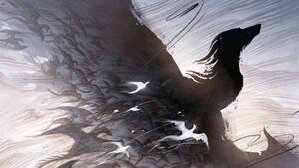Mirrors are abundant in fiction. To name only a few, there is the mirror portal in Through the Looking-Glass, and What Alice Found There, the magic mirror in “Snow White,” Galadriel’s mirror in Lord of the Rings. In the first, a mirror is a gateway to a fantastic, alternate reality where the rules of our world do not apply. In the second, a mirror assesses beauty but is also a truth teller. In the third, a mirror reveals that which is inchoate, hidden, or has been forgotten. Altogether, mirrors are conceits that storytellers employ to convey something meaningful about the characters, their relationships, and the choices that drive their lives. Steven Millhauser does this masterfully in "Magic Polish," the first short story in his collection Voices in the Night.
The opening of the story lets the reader know immediately that it is preoccupied with burdens: the literal kind of disheveled, desperate, door-to-door salesmen with their heavy sample cases; and the metaphorical kind borne by people buried beneath years of disappointments. The first paragraph begins with a sentence that contains five negational words and concludes with the phrase, "Don't be a fool!" The paragraph's descriptions are dull and functional save for a few precise observations that throw into relief a sense of adversity. The reader recognizes the story's unnamed narrator; he is every curmudgeon that we've ever known, the ones we tolerate or avoid socially, and the ones we harbor within ourselves, ready to rage when incited.
In fiction, you know the characters are going to be thrown off course, taken to task or subjected to situations that require difficult choices. Sometimes the reader doesn't know which road the characters will take nor what lies in wait for them up ahead. "Magic Polish's" incitement comes in the form of a small brown bottle filled with greenish white fluid, and Millhauser's curmudgeon is thrown off course the moment he applies a bit of it to a tissue and wipes a smudge from an oval mirror.
“Now I was standing before a man who resembled my old reflection almost exactly but who had been changed in some manner, the way a lawn under a cloudy sky changes when the sun comes out. What I saw was a man who had something to look forward to, a man who expected things of life.”
I should disclose that I’ve been doing some mirror play of my own. Above the sink in my bathroom is a chipped, 12” x 18” mirror in need of a good polishing. These days I spend a lot of time looking into it; breakups tend to provoke plenty of reflection.
The Jons on both sides of the mirror are covering all the usual questions. Is my face too boyish? Are my hips too wide, thighs too womanly? Does my skin and its color preclude any consideration of romance? Then comes the despair, and we think there will never be another love. How would we endure it? Would we become meaner and more resentful? Will our eyes betray the sorrow behind them? Will our bodies always be framed by their collapsed shoulders?
Millhauser plays with similarly glum questions, chief among them is what happens to a person whose eyes have been darkened by many disappointments and who now confronts a fresh, unburdened reflection of him or herself? Opposing answers are set on a collision course with one another. Millhauser is deft at drawing out tensions as the story's characters reach for transcendence with arms stunted by personal misfortune. The negative, irritable language of the opening flowers into colorful, vibrant prose rendering a Saturday picnic that engenders envy in this landlocked reader. But I'll say it again: this story is preoccupied with burdens. Even the fresh reflections, which inspire new visions that pine for incarnation, become heavy and ultimately suffer at the hands of hurt and hardened pessimists.
Now here I am before a man staring back at me from a chipped mirror, knees buckling under the weight of one of life's most bitter disappointments, wondering what is most illusory: abiding love and commitment, or thoughts that it may never happen for me. Fortunately, fiction is also a mirror, one that reflects all facets of human experience. I hope Steven doesn't mind if I change the tense of his words:
“Far from escaping into a world of polished illusions, I (am) able to see, in the depths of (these) mirrors, the world no longer darkened by diminishing hopes and fading dreams. There, all (is) clear, all (is) possible.”














Cadwell Turnbull's new novel — the first in a trilogy — imagines the hard, uncertain work of a fantastical justice.